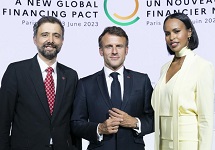The Government of France announced it will champion International Fund for Agricultural Development (IFAD’s) current resource mobilization efforts to bring the world closer to zero hunger and meet the Sustainable Development Goals (SDGs).
France made the announcement during the Summit for a New Global Financing Pact, being held in Paris from June 22-23. France’s President, Emmanuel Macron, called on global leaders to substantially increase their contributions to the United Nations IFAD at a time when boosting agricultural development and climate adaptation is critical to future global food security and stability.
Over the next year its 177 member states will define the strategic priorities and commit funds to IFAD for its work in 2025-2027. France also announced it will host a landmark and final fund raising session of the replenishment in Paris in December 2023. In line with discussions at the Paris Summit, an ambitious IFAD replenishment is key to channelling more funding to some of the world’s poorest rural populations and small-scale farmers who are essential to long-lasting global food security and poverty reduction.
“My priority is to ensure IFAD is resourced to meet the aggravating food crisis worldwide, while also contributing to fighting poverty and inequality, especially in rural areas, and supporting climate action for the most vulnerable ones. I urge the global community to come together in Paris next December for the next replenishment session, to ensure we fund their vital work,” said France’s President Emmanuel Macron.
IFAD has launched a call to mobilize at least US $10 billion to strengthen and transform food systems and boost climate adaptation, food security and incomes for 110 million small-scale farmers. They produce one third of the world’s food and up to 70 percent of the food in low- and middle-income countries. While they are key to feeding a growing world population, they disproportionately suffer from hunger, poverty and the impacts of climate change.
Investments to boost production, build resilience to climate change and provide access to knowledge, markets and technologies, can lift rural populations out of poverty and hunger. Investing in agriculture is two to three times more effective at reducing poverty than investment in any other sector. “This is why IFAD needs governments to step up their funding now,” IFAD said in a press statement.
“An investment in IFAD is an investment in the world’s most powerful asset – its farmers who are key to protecting the environment and feeding a growing world. By financing a stronger IFAD, leaders can send a clear message that the world is serious about stemming hunger and supporting nations who are crippled by rising debt,” said Alvaro Lario, President of IFAD.
IFAD’s replenishment is taking place against a backdrop of rising hunger and poverty worldwide. Undernourishment, affected one in ten people in 2021 due to the combined effects of climate change, conflicts, biodiversity loss and economic disruptions caused by the COVID-19 pandemic. This crisis was amplified by the outbreak of Russia’s war of aggression in Ukraine.
“I don’t need to tell you how urgent the need is. Eight hundred million women, children and men are too hungry to live normal and productive lives. The people who grow our food do not have enough to feed themselves. I am grateful to see this leadership from France– the world’s farmers are depending on us all to take action this December and this leadership, now, matters more than ever, ” said UN Goodwill Ambassador, Sabrina Dhowre Elba.
France has long championed sustainable agriculture as key to eliminate hunger and poverty and protect the earth’s climate and biodiversity. France is a founding member of IFAD and the 2nd largest contributor to its ongoing funding cycle (2022-2024). For almost 45 years, IFAD has stood by the side of small-scale producers and rural populations who are essential contributors to local food systems.
Between 2019 and 2021, IFAD investments increased the incomes of 77 million people living in rural areas, and strengthened the food resilience of 38 million people. To achieve this, IFAD mobilizes public and private investments in agriculture and rural enterprise development, transforming each euro of contribution from member states into six euros of investment in the field.
This is why in 2022, France and the EU joined forces with IFAD to launch the “FARM” (Food and Agriculture Resilience Mission) initiative to promote the resilience and sustainability of food systems in the countries hardest hit by the food crisis resulting from the war in Ukraine. With financial support from France, IFAD is hosting the secretariat for the 3rd pillar of the initiative, whose mission is to strengthen coordination between donors and national partners to increase sustainable agricultural production.
The quantity of Official Development Aid (ODA) directed at agriculture has been stagnant at 4 to 6% of ODA for at least two decades. Small-scale farmers receive less than 2% of global climate finance, globally.
Last February IFAD launched its 13th replenishment calling for increased investments in small-scale farmers and rural populations across developing countries. IFAD’s resources are replenished every three years by Member States.
IFAD is an international financial institution and a United Nations specialized agency. Based in Rome – the United Nations food and agriculture hub – IFAD invests in rural people, empowering them to reduce poverty, increase food security, improve nutrition and strengthen resilience. Since 1978, we have provided more than US $24 billion in grants and low-interest loans to fund projects in developing countries.

